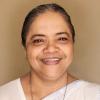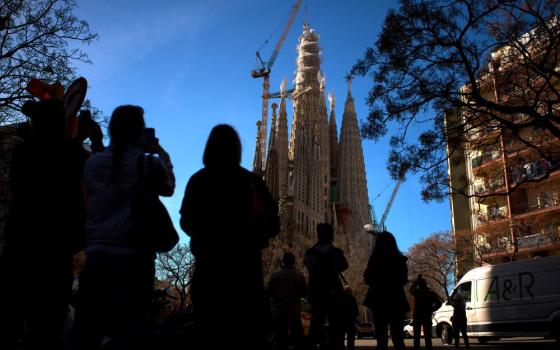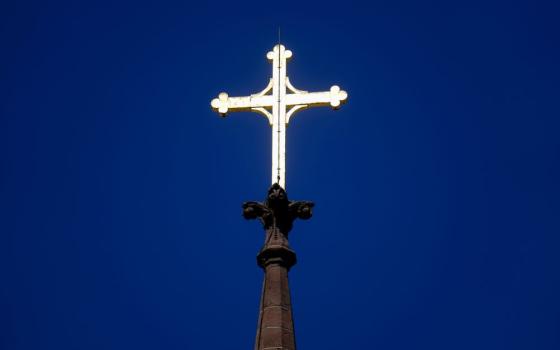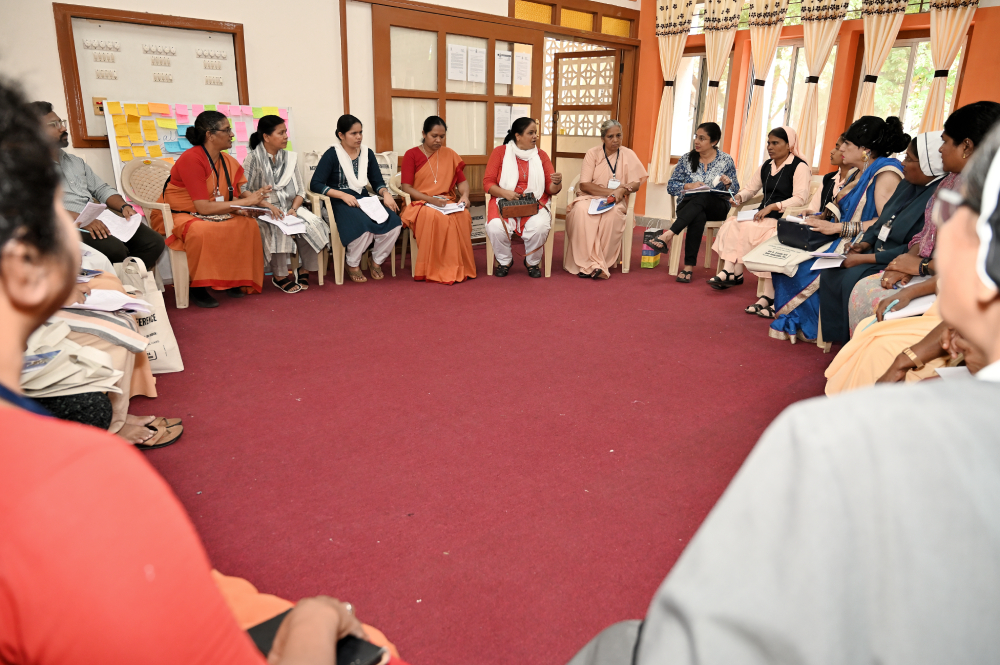
Women religious and transgender individuals engage in a group discussion at "Gender and Sexual Minorities in India: A Synodal Approach to Pastoral Care and Social Inclusion," a conference on LGBTQ+ and faith issues. (Photo courtesy Sr. Margaret Gonsalves)
While teaching spoken English through my signature program, MADness, to Indigenous nursing students at Kaniguma Village in Kalahandi, Odisha, I learned the meanings of "wholeness" and "ecumenism."
Whenever I could, I offered donations to these girls to buy some chicken. The team of girls cooking for that week sat together and figured out how much chicken and spices to buy, who would buy the chicken, who would cut it, who would grind the spices and who would cook the chicken and serve it. While they were discussing, I suggested buying dressed chicken but they wanted live chickens. When I asked why, they said, "Traditionally, we come together to kill the chicken so we get the most out of it. Plus, the joy of coming together is fun."
They bought two to three live chickens, and I followed them to the riverbank. Cutting the chicken, grinding the spices on a stone and cooking it on the firewood was a group effort. Once the food was ready, everyone received an equal amount as wholeness is a hallmark of Indigenous community life.
Vatican II explored the mystery of the church and brought us closer to the truth that our mother church is not a hierarchy but the whole people of God. After the Synod on Synodality, our mother church, through her prophetic Pope, is further healing, bringing ecumenism from a disintegrated whole to a seamless whole.
I was recently invited to participate in two conferences based on my involvement in implementing the teachings of Vatican II, Laudato Si', the ecumenical thrust of my congregation and the Synod on Synodality. These conferences also resonated with my ministry of empowering Indigenous women.
The first conference was held on October 4-5, 2023, and was initiated by lay women from many religions and the LGBTQ+ community. There were around 300 participants. The second conference, October 19-22, 2024, on "Gender and Sexual Minorities in India: A Synodal Approach to Pastoral Care and Social Inclusion," was organized by Bridge and Embrace, a Catholic LGBTQ+ ministry in India and was hosted by Ishvani Kendra, an Institute of Missiology and Communications, providing a platform for deep synodal listening, its first-ever conference on LGBTQ+ and faith issues.
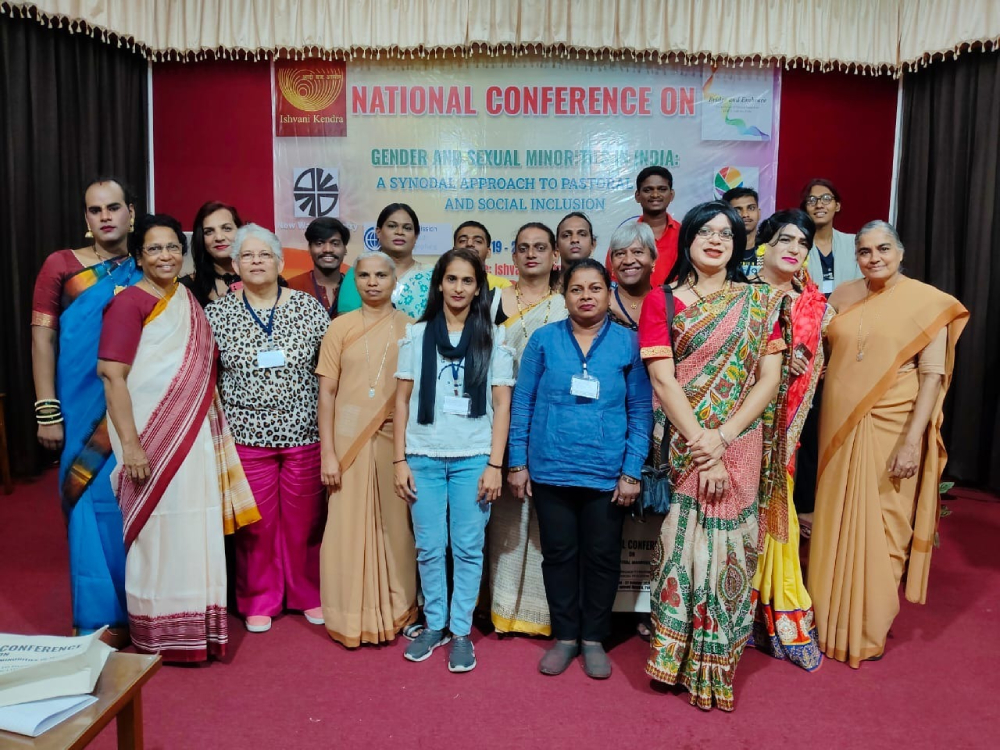
Sr. Margaret Gonsalves is pictured with several participants at "Gender and Sexual Minorities in India: A Synodal Approach to Pastoral Care and Social Inclusion" a conference on LGBTQ+ and faith issues organized in October 2024 by Bridge and Embrace, a Catholic LGBTQ+ ministry in India and hosted by Ishvani Kendra. (Photo courtesy Sr. Margaret Gonsalves)
Among participants were about 80 LGBTQ+ community members, religious sisters from 42 congregations, clergymen and religious men from 30 congregations, and 40 lay people from various dioceses in India. It was a welcoming place for people of all castes, creeds, religions, genders and sexual orientations, where everyone was treated with respect, compassion and sensitivity.
Letters of affirmation were read aloud by three Indian cardinals and two archbishops. This signaled confidence for like-minded bishops to follow a more progressive path of social inclusion for LGBTQ+ people. This was the first concrete action by these cardinals and archbishops to support the initiatives taken by religious and lay people promoting gender justice and greater inclusion.
Most of the priests and nuns attending the conference acknowledged that they were listening to LGBTQ+ community members for the first time in their lives. This conference provided a great platform for participants to explore the wealth of biological, emotional and logical benefits of active listening.
Usually, priests and nuns are considered God's chosen people. That day, participants from different Christian denominations and theologians, especially students, expressed that they felt this gathering truly represented "oneness" for all the people of God, making them realize that Jesus' prayer "that all may be one" (John 17:21) was coming to fruition.
Some scholars and theology students shared the need for this type of exposure program, which emphasized three pillars of Vatican II: interreligious dialogue, collegiality and ecumenism. They suggested adding these types of events to seminary and religious formation programs, thus moving from uniformity to pluriformity in every sense, gaining impetus by embracing all into an integrated whole.
On World Youth Day on August 2, Pope Francis sent a powerful message addressing the LGBTQ+ community, insisting that everyone is welcome in the church.
Advertisement
Lacking wholeness will lead us to disastrous brokenness and disintegration. For me, integrity is everything, personal or communal, for the whole people of God. Synodality is a deep, transformative work for listeners who believe in fixing the church as an integrated whole.
The world is going through a change, and our conscious listening should bring us closer to the realities faced by vulnerable groups. St. Paul shows us the road map, "Now you are the body of Christ, and each one of you is a part of it" (1 Corinthians 12:27).
Ecumenism, as I understand it, is a movement rooted in hope that releases the wisdom of wholeness and holiness from all world religions, especially the Indigenous way of life and goddess religions worldwide.
British-born Catholic priest and Benedictine monk, Bede Griffith, who lived and died among Indigenous people in India, said ecumenism "is to open ourselves to the truth in all religions … and to the deep intuitions of tribal religion in Africa and elsewhere, if they are to recover their balance and evolve an authentic form of religion which will answer the needs of the modern world."
During a 2012 Leadership Conference of Women Religious gathering, Sr. Pat Farrell, OSF, spoke fearlessly to a bruised church member that there is no "reason to be fearful of the cataclysmic movements of change swirling around us…we only need to step into the flow…indeed, all creation is groaning in one great act of giving birth."
Participants at these conferences were all seekers and trailblazers of tomorrow's all-inclusive, vibrant and radiant church, where faith in the evolutionary "Omega Point" of spiritual merging is cultivated, fostered and allowed to flourish, reflecting the grandeur and awe of God by committing ourselves to living out the teachings of Jesus. Returning to our Indigenous culture will not make us Indigenous but will help us know our roots of wholeness.
